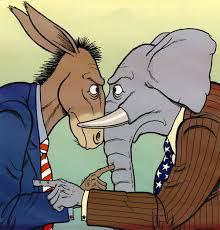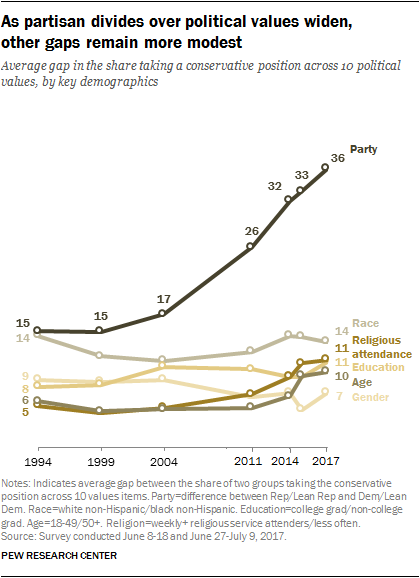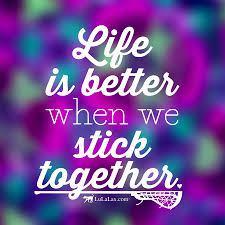 “Humans are extremely loyal to members of their own group. They are even prepared to give up their own lives in defense of those with whom they identify. In sharp contrast, they can behave with lethal aggressiveness toward those who are unfamiliar to them.”
“Humans are extremely loyal to members of their own group. They are even prepared to give up their own lives in defense of those with whom they identify. In sharp contrast, they can behave with lethal aggressiveness toward those who are unfamiliar to them.”
I read that in a book of science essays,* just as I was drafting this piece about about America’s partisan divide. I’ve addressed this before, because it’s hugely portentous.
Humanity as a whole has been gradually overcoming the instinctive tribalism of the quote. Over time our “tribes” have become more inclusive; some people now consider all humankind their tribe. That’s an important factor reducing conflict and violence (as Steven Pinker explained in The Better Angels of Our Nature.) Yet American tribalism still remains strong.
Standard tribalistic divisions entail race/ethnicity; religion; educational level; socio-economic status; language; gender; and age. All these continue to operate in American culture. But another one now trumps them all: political party.

This may seem strange when percentages supporting either party have fallen. Yet, on the other hand, for those still loyal to a party, it’s become more intense.
Look at Pew’s graph, below. In 1994, party affiliation was already the top factor governing attitudes, though neck-and-neck with all the other tribalisms. Since then, party has gained a runaway lead, becoming totally pre-eminent.

In a sense, it’s a logical development. We sacralize the concept of individualism. And as Stanford researcher Iyengar points out, political opinion is deeply personal, seemingly a conscious voluntary choice — unlike those other tribal markers.** Thus people would tend to see their political stance as more reflective of “who they really are.”

And while messages encouraging tribal solidarity based on race or faith or the like are muted, we’re bombarded with messages from numerous sources (not only Russian) aiming to enflame partisan passions. The internet/smartphone/social media revolution is a big factor.
The Stanford researchers found similar trends in other democracies. However, Americans are distinctive in our outward display of partisan identities — bumper stickers, lawn signs, etc. Those aren’t seen in Europe, with less citizen political engagement. (Their campaigns are much shorter too, whereas America’s political season is year-round.)
Interestingly (in light of my opening quote), Stanford also found that while Americans’ in-group favoritism toward fellow partisans is strong, their animosity toward folks in the opposing party is stronger. The two sides inhabit different worlds — they’re strangers to each other, a recipe for hostility.
I used to find Democrats and the left more guilty of demonizing opponents and their motives; but Republicans have leapfrogged over them.

Party actually even trumps ideology. You’d think the two go together. But the meaning of “conservatism” has changed radically, while most Republican “conservatives” seem not to have noticed the bait-and-switch. They stick with their label regardless of its altered content. For some time, Republicanism in the South has really stood for guns, God, and whiteness (look at Alabama’s senate race), but now that has spread to the entire national party, submerging its traditional ideology and values.

Is all this just a phase, that will pass? I doubt it. Our body politic is thoroughly poisoned. We no longer have political debates, we have shouting matches, with neither side interested in considering what the other has to say. And partisan tribalism really does seem to trump everything else, including truth and reason — again, especially among my former Republican comrades.
Political partisans also seem to embody the Vince Lombardi ethos: “winning isn’t the most important thing, it’s the only thing.” Yet while battles can be won, the war is unwinnable. Neither tribe can convince their opponents, nor bludgeon them into surrender. With a political cycle where one party or the other holds power only thanks to the thinnest of electoral margins, its legitimacy always under assault, neither can accomplish much in our system of checks-and-balances.
Rational optimism? I continue to believe our species has a bright future. Our country, not so much.
* “Subverting Biology” by Patrick Bateson, in This Explains Everything, John Brockman, ed.
** Religion should similarly be a choice, but in practice it’s less so.
Advertisements